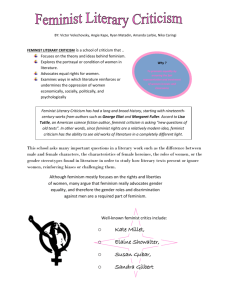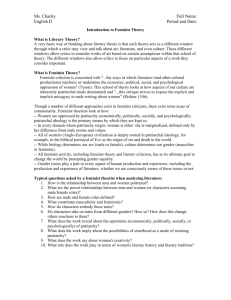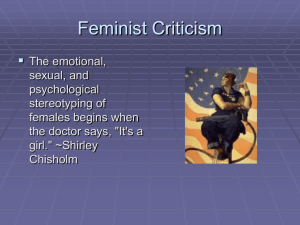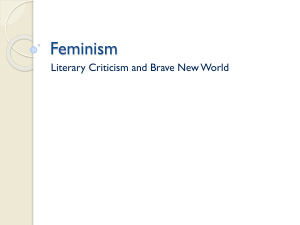Jasmina Lukić
advertisement
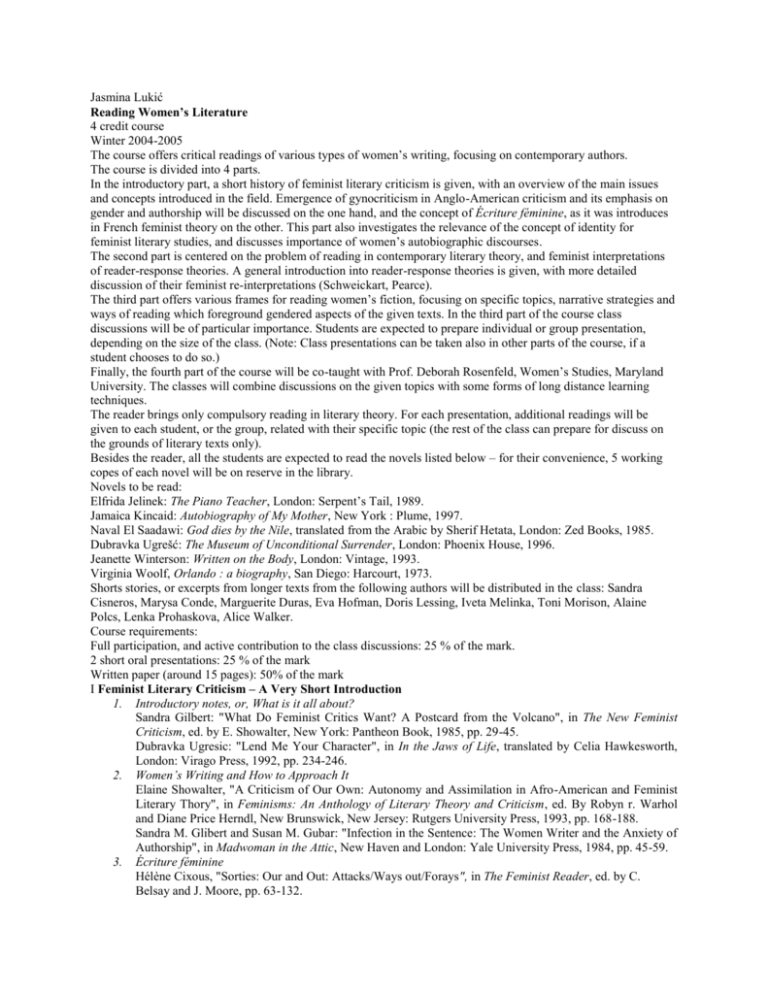
Jasmina Lukić Reading Women’s Literature 4 credit course Winter 2004-2005 The course offers critical readings of various types of women’s writing, focusing on contemporary authors. The course is divided into 4 parts. In the introductory part, a short history of feminist literary criticism is given, with an overview of the main issues and concepts introduced in the field. Emergence of gynocriticism in Anglo-American criticism and its emphasis on gender and authorship will be discussed on the one hand, and the concept of Écriture féminine, as it was introduces in French feminist theory on the other. This part also investigates the relevance of the concept of identity for feminist literary studies, and discusses importance of women’s autobiographic discourses. The second part is centered on the problem of reading in contemporary literary theory, and feminist interpretations of reader-response theories. A general introduction into reader-response theories is given, with more detailed discussion of their feminist re-interpretations (Schweickart, Pearce). The third part offers various frames for reading women’s fiction, focusing on specific topics, narrative strategies and ways of reading which foreground gendered aspects of the given texts. In the third part of the course class discussions will be of particular importance. Students are expected to prepare individual or group presentation, depending on the size of the class. (Note: Class presentations can be taken also in other parts of the course, if a student chooses to do so.) Finally, the fourth part of the course will be co-taught with Prof. Deborah Rosenfeld, Women’s Studies, Maryland University. The classes will combine discussions on the given topics with some forms of long distance learning techniques. The reader brings only compulsory reading in literary theory. For each presentation, additional readings will be given to each student, or the group, related with their specific topic (the rest of the class can prepare for discuss on the grounds of literary texts only). Besides the reader, all the students are expected to read the novels listed below – for their convenience, 5 working copes of each novel will be on reserve in the library. Novels to be read: Elfrida Jelinek: The Piano Teacher, London: Serpent’s Tail, 1989. Jamaica Kincaid: Autobiography of My Mother, New York : Plume, 1997. Naval El Saadawi: God dies by the Nile, translated from the Arabic by Sherif Hetata, London: Zed Books, 1985. Dubravka Ugrešć: The Museum of Unconditional Surrender, London: Phoenix House, 1996. Jeanette Winterson: Written on the Body, London: Vintage, 1993. Virginia Woolf, Orlando : a biography, San Diego: Harcourt, 1973. Shorts stories, or excerpts from longer texts from the following authors will be distributed in the class: Sandra Cisneros, Marysa Conde, Marguerite Duras, Eva Hofman, Doris Lessing, Iveta Melinka, Toni Morison, Alaine Polcs, Lenka Prohaskova, Alice Walker. Course requirements: Full participation, and active contribution to the class discussions: 25 % of the mark. 2 short oral presentations: 25 % of the mark Written paper (around 15 pages): 50% of the mark I Feminist Literary Criticism – A Very Short Introduction 1. Introductory notes, or, What is it all about? Sandra Gilbert: "What Do Feminist Critics Want? A Postcard from the Volcano", in The New Feminist Criticism, ed. by E. Showalter, New York: Pantheon Book, 1985, pp. 29-45. Dubravka Ugresic: "Lend Me Your Character", in In the Jaws of Life, translated by Celia Hawkesworth, London: Virago Press, 1992, pp. 234-246. 2. Women’s Writing and How to Approach It Elaine Showalter, "A Criticism of Our Own: Autonomy and Assimilation in Afro-American and Feminist Literary Thory", in Feminisms: An Anthology of Literary Theory and Criticism, ed. By Robyn r. Warhol and Diane Price Herndl, New Brunswick, New Jersey: Rutgers University Press, 1993, pp. 168-188. Sandra M. Glibert and Susan M. Gubar: "Infection in the Sentence: The Women Writer and the Anxiety of Authorship", in Madwoman in the Attic, New Haven and London: Yale University Press, 1984, pp. 45-59. 3. Écriture féminine Hélène Cixous, "Sorties: Our and Out: Attacks/Ways out/Forays", in The Feminist Reader, ed. by C. Belsay and J. Moore, pp. 63-132. 4. 5. 6. 7. 8. 9. 10. 11. 12. 13. 14. 15. 16. 17. 18. 19. 20. 21. Feminism after Death of the Author Roland Barthes, "The Death of the Author", in Modern Criticism and Theory, second edition, ed. By David Lodge, Harlow, Engalnd: Longman, 2000, pp. 146-150. Michael Fouacault, "What is an Author", in Modern Criticism and Theory, second edition, ed. By David Lodge, Harlow, Engalnd: Longman, 2000, pp. 174-187. Elizabeth Grosz, "Sexual Sigantures: Feminism after the Death of the Author", in Space, Time and Pervesion, New York and London: Routledge, pp. 9-24. The Geographics of Identity Susan Stanford Friedman, ‘"Beyond" Gynocriticism and Gynesis: The Geographics of Identity and the Future of Feminist Criticism", in Tulsa Studies in Women’s Literature, Vol. 15, No. 1 (Spring, 1996), 1340. Autobiography as a Gendered Genre (and to whom women are narrating) Susanah Radstone, "Autobiographical Times", in Feminism and Autobiography: Text. Theories, Methods, Ed. By Tess Cosslett et al., London and New York: Routledge, 2000, pp. 201-219. II Gender and Reading Reader-response theories Volfgang Iser, "The Reading Process: A phenomenological Approach", in Modern Criticism and Theory, second edition, ed. By David Lodge, Harlow, Engalnd: Longman, 2000, pp.189-205. Stenley Fish, "Interpreting Veriourum", in Modern Criticism and Theory, second edition, ed. By David Lodge, Harlow, Engalnd: Longman, 2000, pp. 288-306. Narratological perspectives on reading William Nelles, "Historical and Implied Authors and Readers", in Comparative Literature, Vol. 45, No. 1 (Winter, 1993), pp. 22-46. Feminist perspectives on reading I Rita Felski, "Readers", in Literature and Feminism, Chicago and London: The University Of Chicago Press, 2003, pp. 23-56. Patrochinio P. Schweickart, "Reading Ourselves: Toward a Feminist Theory of Reading", in Speaking of Gender, ed. by E. Showalter, New York and London: Routledge, 1989, pp. 17-44. Feminist perspectives on reading II Lynne Pearce, "The Ghostly romance: Towards a Theory of Implicated Reading", and "Readers in Disagreement", in Feminism and the Politics of Reading, London: Arnold, 1997, pp. 1-33, and 193-219. Queer Reading Judith Butler, "Imitation and Gender Insubordination", in Inside/Out, Lesbian Theories, Gay Theories, ed. By Diana fuss, New York and London: Routledge, 1991, pp. 13-31. Jean E. Kennard, "Ourself behind Ourself: A Theory for lesbian Readers", in Speaking of Gender, ed. by E. Showalter, New York and London: Routledge, 1989, pp. 63-80. III Politics of Gender Narrative identities (class discussion on narrative strategies, and narrator/narratee relations in the given novels) Women and normative heterosexuality (Woolf, Jelinek, Duras, Saadawi) Motherhood and its controversies (Jelinek, Ugresic, Kincaid) Queer identities (Woolf, Winterson) Race, class and gender in women’s narratives (Conde, Kincaid, Saadawi, Morison, Walker) Multiple identities, border cultures (Woolf, Cisneros, Hofman, Ugresic) Gender and Exile (Ugresic, Hofman) Post-communist cultures (Ugresic, Melinka, Prohaskova) Note: The reader will include notes and suggested reading for the main authors. Separate lists of suggested reading will be given to the discussants, in regards with their chosen topics. IV Gender, Texts, And Contexts: Reading Women Writers, Interpreting Sexual/Textual Politics, A Transnational Learning Module Co-taught with Prof. Deborah Rosenfeld, Women’s Studies, University of Maryland Introduction to web-based learning Alice Walker "Advancing Luna -- and Ida B. Wells", in, You Can't Keep a Good Woman Down. New York: Harcourt Brace Jovanovich, 1971-1981. 22. Comparative 23. Class discussion. 24. Final discussion. analysis Walker – Ugrešć. Readings TBA




